If you’re looking to grow your own vegetables in a sustainable and eco-friendly way, then organic vegetable gardening might be the perfect solution for you.
Organic gardening is a method of growing plants without the use of synthetic fertilizers, pesticides, or genetically modified organisms. Instead, it relies on natural methods to promote plant growth and protect against pests and diseases.
To start an organic vegetable garden, you’ll need to plan out your garden space and choose the right vegetables to grow. It’s important to select easy-to-grow vegetables for your first season and to focus on building healthy soil.
Compost is a great option for adding organic matter to your soil, and it provides plants with the nutrients they need to grow strong and healthy.
Once your garden is established, you can use natural pest control methods, such as companion planting and crop rotation, to keep your plants healthy and free from pests and diseases.
Planning Your Organic Vegetable Garden
When planning your organic vegetable garden, there are a few important factors to consider. In this section, we will cover choosing the right location, selecting organic seeds and seedlings, and soil preparation and fertility.
Choosing the Right Location
Choosing the right location for your organic vegetable garden is crucial for its success. You should look for a spot that receives at least six hours of sunlight per day, has good drainage, and is away from any potential hazards such as trees with invasive roots or areas with high foot traffic. You should also consider the proximity to a water source as regular watering is essential for a healthy garden.
Selecting Organic Seeds and Seedlings
When selecting seeds or seedlings for your organic vegetable garden, it is important to choose organic varieties. Organic seeds and seedlings are free from synthetic pesticides and fertilizers, and are more likely to thrive in an organic garden. You should also choose varieties that are well-suited to your climate and growing conditions.
Soil Preparation and Fertility
Preparing your soil is one of the most important steps in starting an organic vegetable garden. You should begin by testing your soil to determine its pH level and nutrient content. Based on the results, you can add organic matter such as compost, manure, or peat moss to improve the soil’s fertility. You should also consider using cover crops to add nutrients and improve soil structure.
In summary, planning your organic vegetable garden involves choosing the right location, selecting organic seeds and seedlings, and preparing your soil for optimal fertility. By following these steps, you can ensure a successful and bountiful harvest.
Planting and Managing Your Garden
Planting Techniques for Optimal Growth
When it comes to planting your organic vegetable garden, there are a few techniques you can use to ensure optimal growth. First, make sure to plant your vegetables in an area that receives plenty of sunlight. Most vegetables need at least six hours of direct sunlight each day to thrive.
Next, consider the spacing of your plants. Overcrowding can lead to stunted growth and an increased risk of disease. Follow the recommended spacing for each type of vegetable you are planting.
Finally, make sure to plant your vegetables at the right time. Some vegetables, like peas and lettuce, can be planted as soon as the soil can be worked in the spring. Others, like tomatoes and peppers, should be started indoors and transplanted outside once the soil has warmed up.
Watering and Mulching Strategies
Proper watering and mulching are essential for a healthy organic vegetable garden. Water your plants deeply and infrequently, rather than giving them frequent shallow waterings. This will encourage deeper root growth and make your plants more drought-resistant.
Mulching helps to retain moisture in the soil and suppress weeds. Use organic materials like straw, leaves, or grass clippings for best results. Apply a layer of mulch around your plants, but be careful not to cover the stems or leaves.
Natural Pest Control Methods
One of the biggest challenges of organic vegetable gardening is dealing with pests. Fortunately, there are several natural pest control methods you can use to keep your garden healthy.
One strategy is to plant companion plants that repel pests. For example, planting marigolds near your tomatoes can help to deter nematodes and other harmful insects.
Another option is to use natural pest control sprays, like neem oil or insecticidal soap. These products are made from natural ingredients and are safe to use around children and pets.
Finally, consider attracting beneficial insects to your garden. Ladybugs, lacewings, and praying mantises are all natural predators of many common garden pests. Planting flowers like daisies and sunflowers can help to attract these beneficial insects to your garden.
By following these planting and management techniques, you can grow a healthy and productive organic vegetable garden.
Harvesting and Post-Harvest Handling
Timing Your Harvest for Peak Freshness
Timing your harvest is crucial for getting the best flavor and texture from your organic vegetables. Harvesting too early or too late can result in bland or tough produce. The best way to determine when to harvest is to check the ripeness of your vegetables regularly. For example, you can gently squeeze a tomato to see if it is ripe. If it gives slightly, it is ready to harvest.
Another way to know when to harvest is by checking the color of your vegetables. For example, peppers should be fully colored before harvesting. If they are still green, they are not yet ripe.
Proper Techniques for Harvesting Vegetables
When harvesting your organic vegetables, it is important to use proper techniques to avoid damaging the plant or the produce. Use a sharp, clean knife or pruning shears to cut the vegetables from the plant. Pulling or twisting can damage the plant and reduce future yields.
For leafy greens such as lettuce, you can use a pair of scissors to snip the leaves off the plant. This allows the plant to continue growing and producing more leaves.
Storing Your Organic Produce
Proper storage is important to maintain the freshness and quality of your organic produce. Store your vegetables in a cool, dry place such as a root cellar or refrigerator. Avoid storing fruits and vegetables together, as some fruits release ethylene gas which can cause vegetables to spoil faster.
You can also store your vegetables in containers such as plastic bags or glass jars. Make sure to remove any excess moisture before storing to prevent mold growth.
By following these simple tips for harvesting and post-harvest handling, you can enjoy the full flavor and nutritional benefits of your organic vegetables.
Frequently Asked Questions
What are the essential steps to start an organic vegetable garden for beginners?
Starting an organic vegetable garden can be a fun and rewarding experience. Here are the essential steps to get started:
- Choose a location that receives at least six hours of sunlight per day.
- Prepare the soil by adding compost or other organic matter to improve soil fertility.
- Choose the vegetables you want to grow and plan their layout in the garden.
- Plant the vegetables according to their specific requirements.
- Water the garden regularly and use natural pest control methods to protect your plants.
Which vegetables are best suited for organic container gardening?
Many vegetables can be grown in containers, making them perfect for small spaces or balcony gardens. Here are some vegetables that are well-suited for container gardening:
- Tomatoes
- Peppers
- Lettuce
- Spinach
- Radishes
- Carrots
- Beans
- Herbs
How can I maintain soil fertility in my organic vegetable garden?
Maintaining soil fertility is essential for a successful organic vegetable garden. Here are some tips to keep your soil healthy:
- Add compost or other organic matter to the soil regularly.
- Rotate your crops each year to prevent soil-borne diseases.
- Use cover crops to add nutrients to the soil and prevent erosion.
- Avoid using chemical fertilizers and pesticides that can harm beneficial soil organisms.
What natural pest control methods are effective in organic vegetable gardening?
Organic vegetable gardening relies on natural pest control methods to protect your plants. Here are some effective methods to try:
- Companion planting – planting certain plants together can help repel pests.
- Handpicking – remove pests by hand and drop them into soapy water.
- Insecticidal soap – a natural soap solution that can be sprayed on plants to kill pests.
- Neem oil – a natural oil that can be sprayed on plants to repel pests.
How often should I water my organic vegetable garden and what is the best time of day?
Watering your organic vegetable garden depends on several factors such as the weather, soil type, and plant requirements. Generally, it is best to water deeply and infrequently rather than shallowly and frequently. Water in the morning or evening when the temperatures are cooler to reduce water loss through evaporation.
What are the benefits of companion planting in organic vegetable gardening?
Companion planting is the practice of planting certain plants together to benefit each other. Here are some benefits of companion planting:
- Pest control – some plants repel pests that can damage other plants.
- Soil improvement – some plants can add nutrients to the soil or improve soil structure.
- Increased yields – some plants can improve the growth and yield of other plants.
- Biodiversity – planting a variety of plants can attract beneficial insects and wildlife to your garden.



